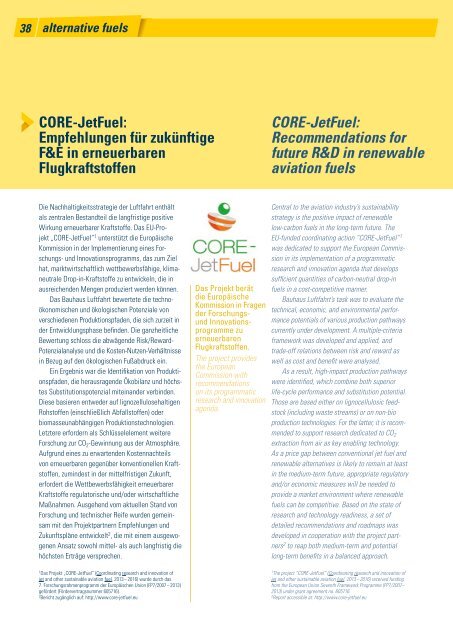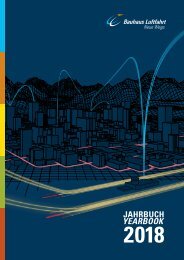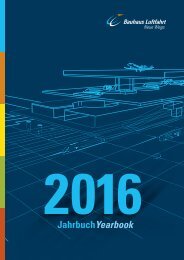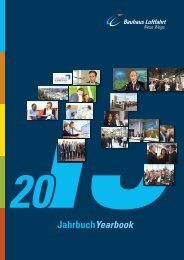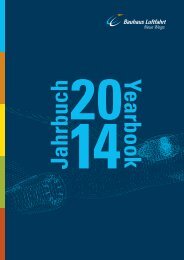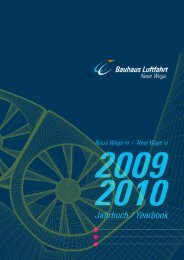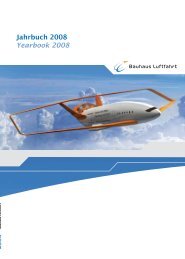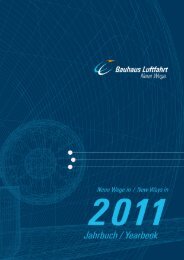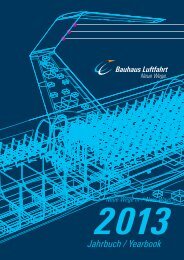Jahrbuch Bauhaus Luftfahrt 2016
Erfolgreiche ePaper selbst erstellen
Machen Sie aus Ihren PDF Publikationen ein blätterbares Flipbook mit unserer einzigartigen Google optimierten e-Paper Software.
38 alternative fuels<br />
CORE-JetFuel:<br />
Empfehlungen für zukünftige<br />
F&E in erneuerbaren<br />
Flugkraftstoffen<br />
CORE-JetFuel:<br />
Recommendations for<br />
future R&D in renewable<br />
aviation fuels<br />
Die Nachhaltigkeitsstrategie der <strong>Luftfahrt</strong> enthält<br />
als zentralen Bestandteil die langfristige positive<br />
Wirkung erneuerbarer Kraftstoffe. Das EU-Projekt<br />
„CORE-JetFuel“ 1 unterstützt die Europäische<br />
Kommission in der Implementierung eines Forschungs-<br />
und Innovationsprogramms, das zum Ziel<br />
hat, marktwirtschaftlich wettbewerbsfähige, klimaneutrale<br />
Drop-in-Kraftstoffe zu entwickeln, die in<br />
ausreichenden Mengen produziert werden können.<br />
Das <strong>Bauhaus</strong> <strong>Luftfahrt</strong> bewertete die technoökonomischen<br />
und ökologischen Potenziale von<br />
verschiedenen Produktionspfaden, die sich zurzeit in<br />
der Entwicklungsphase befinden. Die ganzheitliche<br />
Bewertung schloss die abwägende Risk/Reward-<br />
Potenzialanalyse und die Kosten-Nutzen-Verhältnisse<br />
in Bezug auf den ökologischen Fußabdruck ein.<br />
Ein Ergebnis war die Identifikation von Produktionspfaden,<br />
die herausragende Ökobilanz und höchstes<br />
Substitutionspotenzial miteinander verbinden.<br />
Diese basieren entweder auf lignozellulosehaltigen<br />
Rohstoffen (einschließlich Abfallstoffen) oder<br />
biomasseunabhängigen Produktionstechnologien.<br />
Letztere erfordern als Schlüsselelement weitere<br />
Forschung zur CO 2 -Gewinnung aus der Atmosphäre.<br />
Aufgrund eines zu erwartenden Kostennachteils<br />
von erneuerbaren gegenüber konventionellen Kraftstoffen,<br />
zumindest in der mittelfristigen Zukunft,<br />
erfordert die Wettbewerbsfähigkeit erneuerbarer<br />
Kraftstoffe regulatorische und/oder wirtschaftliche<br />
Maßnahmen. Ausgehend vom aktuellen Stand von<br />
Forschung und technischer Reife wurden gemeinsam<br />
mit den Projektpartnern Empfehlungen und<br />
Zukunftspläne entwickelt 2 , die mit einem ausgewogenen<br />
Ansatz sowohl mittel- als auch langfristig die<br />
höchsten Erträge versprechen.<br />
1 Das Projekt „CORE-JetFuel” (Coordinating research and innovation of<br />
jet and other sustainable aviation fuel, 2013 – <strong>2016</strong>) wurde durch das<br />
7. Forschungsrahmenprogramm der Europäischen Union (FP7/2007 – 2013)<br />
gefördert (Fördervertragsnummer 605716).<br />
2 Bericht zugänglich auf: http://www.core-jetfuel.eu<br />
Das Projekt berät<br />
die Europäische<br />
Kommission in Fragen<br />
der Forschungsund<br />
Innovationsprogramme<br />
zu<br />
erneuerbaren<br />
Flugkraftstoffen.<br />
The project provides<br />
the European<br />
Commission with<br />
recommendations<br />
on its programmatic<br />
research and innovation<br />
agenda.<br />
Central to the aviation industry’s sustainability<br />
strategy is the positive impact of renewable<br />
low-carbon fuels in the long-term future. The<br />
EU-funded coordinating action “CORE-JetFuel” 1<br />
was dedicated to support the European Commission<br />
in its implementation of a programmatic<br />
research and innovation agenda that develops<br />
sufficient quantities of carbon-neutral drop-in<br />
fuels in a cost-competitive manner.<br />
<strong>Bauhaus</strong> <strong>Luftfahrt</strong>’s task was to evaluate the<br />
technical, economic, and environmental performance<br />
potentials of various production pathways<br />
currently under development. A multiple-criteria<br />
framework was developed and applied, and<br />
trade-off relations between risk and reward as<br />
well as cost and benefit were analysed.<br />
As a result, high-impact production pathways<br />
were identified, which combine both superior<br />
life-cycle performance and substitution potential.<br />
Those are based either on lignocellulosic feedstock<br />
(including waste streams) or on non-bio<br />
production technologies. For the latter, it is recommended<br />
to support research dedicated to CO 2<br />
extraction from air as key enabling technology.<br />
As a price gap between conventional jet fuel and<br />
renewable alternatives is likely to remain at least<br />
in the medium-term future, appropriate regulatory<br />
and/or economic measures will be needed to<br />
provide a market environment where renewable<br />
fuels can be competitive. Based on the state of<br />
research and technology readiness, a set of<br />
detailed recommendations and roadmaps was<br />
developed in cooperation with the project partners<br />
2 to reap both medium-term and potential<br />
long-term benefits in a balanced approach.<br />
1 The project “CORE-JetFuel” (Coordinating research and innovation of<br />
jet and other sustainable aviation fuel, 2013 – <strong>2016</strong>) received funding<br />
from the European Union Seventh Framework Programme (FP7/2007–<br />
2013) under grant agreement no. 605716.<br />
2 Report accessible at: http://www.core-jetfuel.eu


